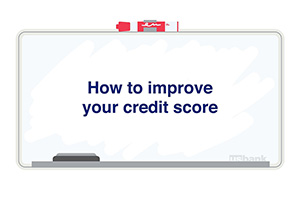
Best travel credit card perks for family vacations

6 essential credit report terms to know

For many students, college is the first time they will live, and manage their finances, independently. While the majority of first-year students don’t have a credit card, 63 percent of upperclassmen use a card as their primary means of payment, according to a study by Sallie Mae. While a credit card can come with temptation, it can also be a great opportunity for college students to start to establish and build the credit they will need to buy a car or rent an apartment after they graduate.
Is your student ready to learn about money and budgeting via a credit card?
Most card issuers have minimum age requirements — often 18 years or over — for student credit cards. If your student meets this threshold, having their name (and only their name) is a possibility. The card can build their credit. But, if the card is used badly, it’s also an opportunity for your student to hurt their credit.
If you’d rather supervise, you can add your student as an authorized user of a card in your name, or you can apply for a card as co-applicants. In either instance, you’ll have full access to the statements. But, whatever happens (good or bad) on the account will be noted in your credit score as well as your student’s.
Talk with your student about putting a system in place to check their balance regularly, and pay on time. Also, decide what happens if your student gets in over their head. Will you step in? (Especially if you’re on a joint account, this might be necessary to avoid a hit to your credit.)
If you do step in, how will your student repay you, or make up for the mistake? Talk through these possibilities now, when you’re both calm, rather than wait until there’s an actual problem.
As far as how payments are actually made, online banking is one popular method. For students on the go, there are mobile options for smartphones, tablets and laptops as well as personalized alerts or automatic bill pay options. Have your student set up what works best for them.
First, what is your student trying to learn? If it’s simply how to spend and save, a checking account might make more sense, particularly if it has a debit card attached.
With a debit card, major mistakes can be minimized: your student won’t be able to run up debt. And the amount of money available will be as clear as the balance in their account. Similarly, a prepaid card can be a way to improve spending habits and to learn how to budget before graduating to a credit card.
However, these options don’t help college students establish the credit they will need during life after college.
Learn more about paying for education.
Related content


